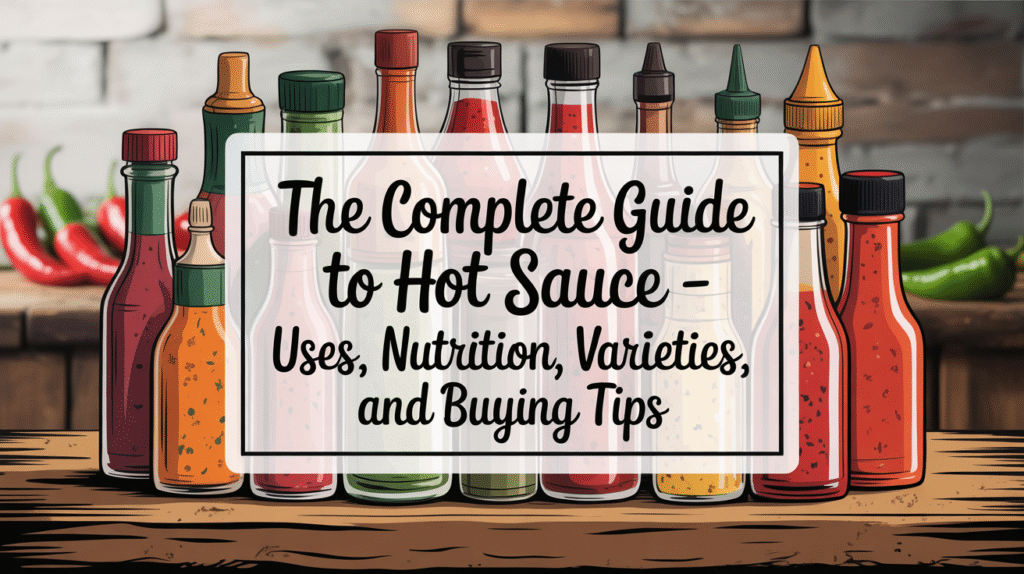Affiliate Disclosure: PantryBrands.co.uk is a participant in the Amazon.co.uk Associates Programme. As an Amazon Associate, we earn from qualifying purchases made through links on this site.
Hot sauce is a fiery condiment made primarily from chilli peppers, vinegar, and salt, loved for its ability to add heat and flavour to a wide range of dishes. From mild jalapeño blends to intensely hot ghost pepper sauces, there’s a variety to suit every palate. This guide covers cooking uses, health benefits, heat levels, and storage tips.

Hot Sauce Cooking & Pairing Ideas
Hot sauce goes far beyond topping tacos – it’s a versatile flavour booster.
- Egg Dishes – A splash over scrambled eggs, omelettes, or breakfast burritos.
- Soups & Stews – Adds warmth and depth to tomato soups, chowders, and chilli.
- Marinades & Glazes – Combine with honey or soy sauce for sweet-spicy meat coatings.
- Snacks & Finger Foods – Perfect for wings, fries, nachos, and even pizza.
Hot Sauce Health & Capsaicin Benefits
Capsaicin, the active compound in chilli peppers, is linked to several potential health benefits.
- Metabolism Boost – May temporarily increase calorie burn.
- Pain Relief – Capsaicin creams are used for topical pain management.
- Antioxidants – Chilli peppers provide vitamins A and C.
- Caution – Excessive consumption can irritate the stomach or cause heartburn.
Tip: Start with milder sauces if you’re new to chilli heat.
Top UK Artisan Hot Sauce Brands
The UK has a growing market for craft and artisan hot sauces.
- Encona – Caribbean-inspired flavours with varying heat levels.
- Cholula – Mild Mexican-style hot sauce with a tangy profile.
- Wiltshire Chilli Farm – Small-batch, bold and spicy blends.
- Crazy Bastard Sauce – Internationally influenced with unique chilli combinations.
Hot Sauce vs Chilli Sauce
Although often used interchangeably, there’s a difference.
- Hot Sauce – Thinner, vinegar-forward, and spicier; used to season dishes.
- Chilli Sauce – Thicker, sweeter, and often used as a condiment or dipping sauce.
When to Choose: Hot sauce for heat and tang; chilli sauce for sweetness with mild spice.
Homemade Fermented Hot Sauce Recipes
Fermentation adds complexity and depth to hot sauce flavour.
Basic Method:
- Blend fresh chillies with salt.
- Ferment in a jar for 1–2 weeks.
- Blend with vinegar, strain, and bottle.
Storage: Refrigerate for up to 6 months.
Heat Levels & Styles of Hot Sauce
Hot sauces vary widely in flavour and spice.
- Mild – Jalapeño, sweet chilli, or green pepper sauces.
- Medium – Chipotle, cayenne, or habanero-based blends.
- Hot – Scotch bonnet, ghost pepper, or Carolina Reaper sauces.
- Speciality – Fruit-infused or smoky BBQ-style hot sauces.
Hot Sauce Ingredient Breakdown
Most hot sauces contain:
- Chillies – The heat source, with varying spice levels.
- Vinegar – Preserves and adds tanginess.
- Salt – Enhances flavour and aids preservation.
- Optional Additions – Garlic, onions, fruit, or herbs for complexity.
Hot Sauce Scoville & Nutrition Guide
The Scoville scale measures chilli pepper heat.
- Jalapeño – 2,500–8,000 SHU (mild).
- Habanero – 100,000–350,000 SHU (hot).
- Ghost Pepper – 800,000–1,041,427 SHU (very hot).
- Carolina Reaper – Over 2,000,000 SHU (extreme).
Nutrition: Typically low in calories, but can be high in sodium.
Hot Sauce Storage & Fermentation Care
Proper storage preserves heat and flavour.
- Before Opening – Store in a cool, dark cupboard.
- After Opening – Refrigerate to extend shelf life and maintain colour.
- Fermented Sauces – Keep sealed tightly to prevent contamination.
Buying Craft Hot Sauces in the UK
Look for:
- Natural Ingredients – Avoid artificial preservatives if possible.
- Chilli Variety – Different peppers offer distinct heat and flavour.
- Batch Size – Small-batch sauces often have fresher taste.
FAQs about Hot Sauce
Here are some questions and answers about hot sauce.
Is hot sauce good for health?
In moderation, it can provide antioxidants and a metabolism boost, but too much may cause digestive discomfort.
Can hot sauce lose its heat over time?
Yes – capsaicin potency can fade, especially if exposed to light and heat.
Does hot sauce need refrigeration?
Most do after opening, especially natural or fermented varieties, to maintain quality.
